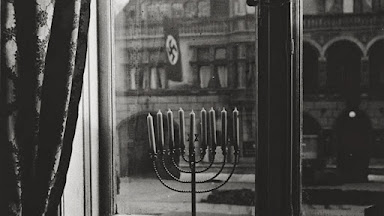However, there is a stronger connection that can be found today, to the themes underlying the story of Chanukah. The connection relates to the massacre on October 7th, but does not center Jewish sovereignty in our ancestral homeland. It focuses on Jewish survival in the diaspora. Prior to the invasion in 175 BCE, Judea had already been encompassed within the Seleucid Empire, and others before that. Many of the Israelites had assimilated to the customs of the empire-of-the-day.
 |
| Menorah In The Foreground |
It was the steadfast Jews, those who refused to give up our traditions, who angered Antiochus. Those who would not hide in their basements. The troublemakers. Those who maintained our Peoplehood. Those who were not afraid to speak up. The ancient Zionists.
In those days, there was no real diaspora. Today, there is. And here, in the diaspora, it is only the steadfast Jews who survive, as Jews. Secularization and assimilation caused the Jewish people – more than seven decades since our brush with extinction at the hands of an authoritarian, extremist regime – to remain fewer in number than prior to WWII. Nearly half of us live in Israel, and we were expelled or killed in a dozen nations in the years around and following WWII.
And here, in the diaspora, today… We’ve again been told we do not belong. We cannot remain as we are. We cannot believe as we do. We are not entitled to our ancestral homeland. Chanukah celebrations have been canceled due to security concerns or to avoid the appearance of supporting Israel. We are simultaneously told anti-Zionism is not anti-Semitism, while being told that supporting the Jewish people is supporting Israel.
Elie Weisel, Holocaust survivor and advocate for justice, said “as a Jew, I need Israel. More precisely: I can live as a Jew outside Israel but not without Israel." And for these past two months, we’ve been told that we do not deserve Israel. We do not deserve to exist.
We will remain steadfast. Here, in the diaspora, and certainly in our homeland. Am Yisrael Chai.
In those days, there was no real diaspora. Today, there is. And here, in the diaspora, it is only the steadfast Jews who survive, as Jews. Secularization and assimilation caused the Jewish people – more than seven decades since our brush with extinction at the hands of an authoritarian, extremist regime – to remain fewer in number than prior to WWII. Nearly half of us live in Israel, and we were expelled or killed in a dozen nations in the years around and following WWII.
And here, in the diaspora, today… We’ve again been told we do not belong. We cannot remain as we are. We cannot believe as we do. We are not entitled to our ancestral homeland. Chanukah celebrations have been canceled due to security concerns or to avoid the appearance of supporting Israel. We are simultaneously told anti-Zionism is not anti-Semitism, while being told that supporting the Jewish people is supporting Israel.
Elie Weisel, Holocaust survivor and advocate for justice, said “as a Jew, I need Israel. More precisely: I can live as a Jew outside Israel but not without Israel." And for these past two months, we’ve been told that we do not deserve Israel. We do not deserve to exist.
We will remain steadfast. Here, in the diaspora, and certainly in our homeland. Am Yisrael Chai.




